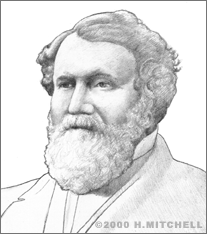Cyrus McCormick
Cyrus Hall McCormick was born in 1809. He grew up on his family's 532-acre farm, "Walnut Grove", which was located north of Lexington, Virginia. As a boy, McCormick had a talent for both agriculture and inventing. At the age of 15, he invented a lightweight cradle for carting harvested grain (1824). Meanwhile, McCormick's father, Robert, was working in the farm's smithy on an invention of his own: a horse-drawn reaping machine. When Robert McCormick finally gave up on producing a working model, in the early fall of 1831, his son took over the challenge.
At that time, grain was harvested by the same manual process that had been used since the dawn of agriculture. The reapers mowed down the standing grain with a hand-swung scythe, and the binders followed behind them, tying the crop into bales, which were then carted away, usually for storage in barns. Because reaping was a much more painstaking process than sowing, even farmers with land and seed to spare were forced to limit their crop to what they could reap in a given season.
Using his father's incomplete model as a starting point, McCormick sketched out plans for a machine that would automatically cut, thresh, and bundle grain while being pulled through a field by horses. Within six weeks – before the 1831 harvest was over – he had built, field-tested, remodelled, and successfully demonstrated the world's first mechanical reaper to the public. McCormick had singlehandedly increased farms' potential yield at least tenfold, with minimal effort by farmers. Astonishingly, they remained uninterested or at least unconvinced. For nine years, sales for the device were virtually zero.
Farmers were leery of change and were put off by a machine that would later be described as a "contraption seemingly a cross between a wheelbarrow, a chariot, and a flying machine." Undaunted, McCormick spent ten years making improvements, earning his first patent along the way (1834). He also utilized novel business practices, including lenient credit for purchases, written performance guarantees ("15 acres a day"), readily available replacement parts, and advertising that educated farming communities about the benefits of technology.
Beginning in 1841, the mechanical reaper finally caught on, so much so that McCormick was later forced to move production out of his family farm's blacksmith shop and into a factory in Chicago (1847). McCormick's machine meant that the prairies of the Midwest could now become the "breadbasket" of the nation.
In 1851, McCormick's machine became an international sensation. He won the Gold Medal at the London Crystal Palace Exposition of that year, then went on to stun audiences in Hamburg, Vienna, and Paris. McCormick was elected into the French Academy of Sciences for "having done more for agriculture than any other living man."
Returning to the U.S., McCormick still faced substantial challenges. For years, he was forced to defend his patent rights in court. The Chicago Fire of 1871 destroyed his factory. However, by the time of his death in 1884, both his fame and his business were secure.
Because his reaper enabled much fewer farmers to produce much more grain, Cyrus McCormick not only transformed agriculture, but also diversified American industry. In 1831, 90% of the U.S. population was involved in farming. Today, only 2% of the population produces more food than the country can consume. The machines manufactured by McCormick's company and its successor, International Harvester Co., now harvest hundreds of acres a day. They have enabled the vast majority of Americans to apply their talent and energy to fields like engineering, medicine, and the arts.


